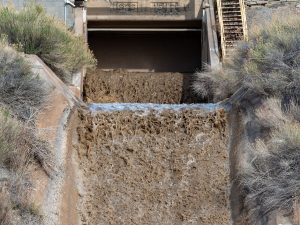Water returns to Highline Lake after zebra mussel contamination and cleanup
Zebra mussels were first discovered in the lake in 2022

Colorado Parks and Wildlife/Courtesy Photo
The headgates are open and water is returning to Highline Lake in the state park located outside of Grand Junction.
The lake — fed by the Government Highline Canal and connected to the Colorado River — was drained in November after a years-long battle against invasive zebra mussels. Colorado Parks and Wildlife announced that it began refilling the lake on March 31.
The first adult zebra mussel was found in the lake in 2022, marking the first discovery of the species in Colorado water. After finding more mussels, Colorado Parks and Wildlife launched a response that included applying molluscicide to the lake, water sampling, cleanup efforts and ultimately, draining the lake entirely. This was the first time the lake was fully emptied in 60 years.
Zebra mussels are known for their rapid reproduction rate and have significant ecological impacts. The species can negatively impact fish populations as they can kill off essential prey, including plankton. Adult zebra mussels can also clog water infrastructure.
Parks and Wildlife reported that the lake will fill gradually in the coming weeks and should be open for all surface activities this year. The agency has not set the opening date yet. Once the lake is returned to a normal water level, the wildlife agency will begin restocking the lake with catchable trout.
Robert Walters, Parks and Wildlife’s invasive species program manager, said in a news release the agency was hopeful that draining Highline Lake eradicated the zebra mussels.
“However, Highline Lake will be considered infested until we have five consecutive years of negative results,” Walters stated. “During this time, boats leaving Highline Lake will require decontamination as part of our ongoing efforts to stop zebra mussels from spreading further within our state.”
The agency will monitor and sample the lake weekly for the invasive species, including shoreline, substrate and plankton tow sampling. All boats entering the lake are required to be cleaned, drained and dry. Upon exiting the lake, all watercraft will be inspected and decontaminated.
If no zebra mussels or other invasive aquatic species are detected for five consecutive years, the lake will revert to a negative prevention status, according to the agency.
While it was drained, several improvements and updates were made to the lake to improve habitat and prevent future contamination from invasive species. This included repairs to the boat ramp, upgrades to the aquatic nuisance species inspection and decontamination stations, repairs and cleanup of the outlet drain, and installation of new fish structures on the lake bed.
In addition to the discovery of zebra mussels in Highline Lake, several veligers — the species’ free-floating larvae — were found in the Colorado River near Grand Junction and the Government Highline Canal in early July. Subsequent sampling of these waterways turned up no additional zebra mussel veligers or adults.

Support Local Journalism

Support Local Journalism
As a Summit Daily News reader, you make our work possible.
Summit Daily is embarking on a multiyear project to digitize its archives going back to 1989 and make them available to the public in partnership with the Colorado Historic Newspapers Collection. The full project is expected to cost about $165,000. All donations made in 2023 will go directly toward this project.
Every contribution, no matter the size, will make a difference.










